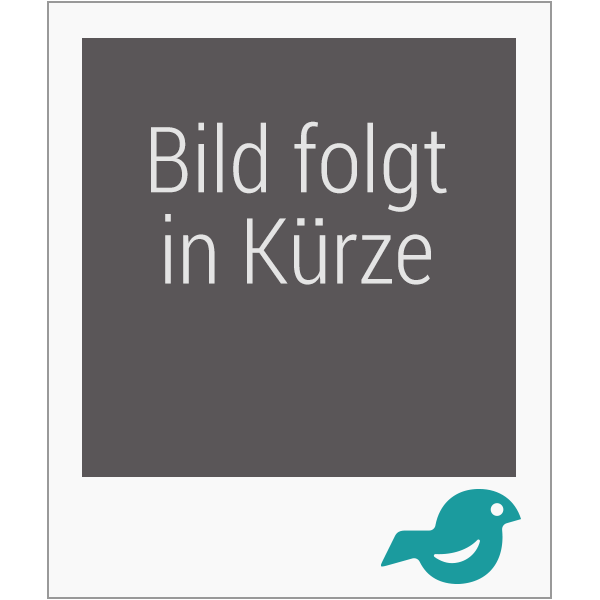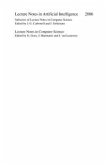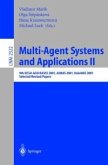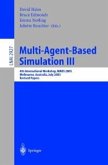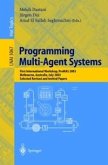Regulated Agent-Based Social Systems (eBook, PDF)
First International Workshop, RASTA 2002, Bologna, Italy, July 16, 2002, Revised Selected and Invited Papers
Redaktion: Lindemann, Gabriela; Paolucci, Mario; Moldt, Daniel
40,95 €
40,95 €
inkl. MwSt.
Sofort per Download lieferbar

20 °P sammeln
40,95 €
Als Download kaufen

40,95 €
inkl. MwSt.
Sofort per Download lieferbar

20 °P sammeln
Jetzt verschenken
Alle Infos zum eBook verschenken
40,95 €
inkl. MwSt.
Sofort per Download lieferbar
Alle Infos zum eBook verschenken

20 °P sammeln
Regulated Agent-Based Social Systems (eBook, PDF)
First International Workshop, RASTA 2002, Bologna, Italy, July 16, 2002, Revised Selected and Invited Papers
Redaktion: Lindemann, Gabriela; Paolucci, Mario; Moldt, Daniel
- Format: PDF
- Merkliste
- Auf die Merkliste
- Bewerten Bewerten
- Teilen
- Produkt teilen
- Produkterinnerung
- Produkterinnerung

Bitte loggen Sie sich zunächst in Ihr Kundenkonto ein oder registrieren Sie sich bei
bücher.de, um das eBook-Abo tolino select nutzen zu können.
Hier können Sie sich einloggen
Hier können Sie sich einloggen
Sie sind bereits eingeloggt. Klicken Sie auf 2. tolino select Abo, um fortzufahren.

Bitte loggen Sie sich zunächst in Ihr Kundenkonto ein oder registrieren Sie sich bei bücher.de, um das eBook-Abo tolino select nutzen zu können.
- Geräte: PC
- ohne Kopierschutz
- eBook Hilfe
- Größe: 3.26MB
Andere Kunden interessierten sich auch für
![Multi-Agent Systems and Applications (eBook, PDF) Multi-Agent Systems and Applications (eBook, PDF)]() Multi-Agent Systems and Applications (eBook, PDF)40,95 €
Multi-Agent Systems and Applications (eBook, PDF)40,95 €![Multi-Agent-Systems and Applications II (eBook, PDF) Multi-Agent-Systems and Applications II (eBook, PDF)]() Multi-Agent-Systems and Applications II (eBook, PDF)40,95 €
Multi-Agent-Systems and Applications II (eBook, PDF)40,95 €![Multi-Agent-Based Simulation III (eBook, PDF) Multi-Agent-Based Simulation III (eBook, PDF)]() Multi-Agent-Based Simulation III (eBook, PDF)40,95 €
Multi-Agent-Based Simulation III (eBook, PDF)40,95 €![Programming Multi-Agent Systems (eBook, PDF) Programming Multi-Agent Systems (eBook, PDF)]() Programming Multi-Agent Systems (eBook, PDF)40,95 €
Programming Multi-Agent Systems (eBook, PDF)40,95 €![Engineering Societies in the Agents World V (eBook, PDF) Engineering Societies in the Agents World V (eBook, PDF)]() Engineering Societies in the Agents World V (eBook, PDF)40,95 €
Engineering Societies in the Agents World V (eBook, PDF)40,95 €![Engineering Societies in the Agents World VI (eBook, PDF) Engineering Societies in the Agents World VI (eBook, PDF)]() Engineering Societies in the Agents World VI (eBook, PDF)40,95 €
Engineering Societies in the Agents World VI (eBook, PDF)40,95 €![Agent-Based Hybrid Intelligent Systems (eBook, PDF) Agent-Based Hybrid Intelligent Systems (eBook, PDF)]() Agent-Based Hybrid Intelligent Systems (eBook, PDF)61,95 €
Agent-Based Hybrid Intelligent Systems (eBook, PDF)61,95 €-
-
-
Produktdetails
- Verlag: Springer Berlin Heidelberg
- Seitenzahl: 302
- Erscheinungstermin: 6. März 2004
- Englisch
- ISBN-13: 9783540258674
- Artikelnr.: 53333789
Dieser Download kann aus rechtlichen Gründen nur mit Rechnungsadresse in A, B, BG, CY, CZ, D, DK, EW, E, FIN, F, GR, HR, H, IRL, I, LT, L, LR, M, NL, PL, P, R, S, SLO, SK ausgeliefert werden.
- Herstellerkennzeichnung Die Herstellerinformationen sind derzeit nicht verfügbar.
Gabriela Lindemann, Humboldt Universität zu Berlin, Germany / Daniel Moldt, University of Hamburg, Germany / Mario Paolucci, National Research Council, Rome, Italy
Invited Paper.- How Formal Logic Can Fail to Be Useful for Modelling or Designing MAS.- Topic A: Social Theory for Agent Technology.- Communicational Patterns as Basis of Organizational Structures.- On How to Conduct Experimental Research with Self-Motivated Agents.- Cognitive Identity and Social Reflexivity of the Industrial District Firms. Going Beyond the "Complexity Effect" with Agent-Based Simulations.- The MAS-SOC Approach to Multi-agent Based Simulation.- Organisation Modelling for the Dynamics of Complex Biological Processes.- Communication without Agents? From Agent-Oriented to Communication-Oriented Modeling.- Modeling Product Awareness Rates and Market Shares.- Metanarratives and Believable Behavior of Autonomous Agents.- FORM - A Sociologically Founded Framework for Designing Self-Organization of Multiagent Systems.- Social Organization in a Software Agent Community with a Non-zero-Sum Game Interaction Model.- Emotion: Theoretical Investigations and Implications for Artificial Social Aggregates.- Topic B: Norms and Institutions in MAS.- What Is a Normative Goal?.- Searching for a Soulmate - Searching for Tag-Similar Partners Evolves and Supports Specialization in Groups.- Norms and Their Role in a Model of Electronic Institution.- A Model of Normative Multi-agent Systems and Dynamic Relationships.- Integration of Generic Motivations in Social Hybrid Agents.
Invited Paper.- How Formal Logic Can Fail to Be Useful for Modelling or Designing MAS.- Topic A: Social Theory for Agent Technology.- Communicational Patterns as Basis of Organizational Structures.- On How to Conduct Experimental Research with Self-Motivated Agents.- Cognitive Identity and Social Reflexivity of the Industrial District Firms. Going Beyond the "Complexity Effect" with Agent-Based Simulations.- The MAS-SOC Approach to Multi-agent Based Simulation.- Organisation Modelling for the Dynamics of Complex Biological Processes.- Communication without Agents? From Agent-Oriented to Communication-Oriented Modeling.- Modeling Product Awareness Rates and Market Shares.- Metanarratives and Believable Behavior of Autonomous Agents.- FORM - A Sociologically Founded Framework for Designing Self-Organization of Multiagent Systems.- Social Organization in a Software Agent Community with a Non-zero-Sum Game Interaction Model.- Emotion: Theoretical Investigations and Implications for Artificial Social Aggregates.- Topic B: Norms and Institutions in MAS.- What Is a Normative Goal?.- Searching for a Soulmate - Searching for Tag-Similar Partners Evolves and Supports Specialization in Groups.- Norms and Their Role in a Model of Electronic Institution.- A Model of Normative Multi-agent Systems and Dynamic Relationships.- Integration of Generic Motivations in Social Hybrid Agents.
